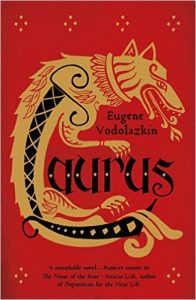 I read “Laurus” because Rod Dreher told me to, on his blog at least, and I do everything Rod Dreher says. I was not disappointed. And if you’d like detailed analysis of the book through a much more sophisticated lens than mine, you should search his blog for his many posts on this book.
I read “Laurus” because Rod Dreher told me to, on his blog at least, and I do everything Rod Dreher says. I was not disappointed. And if you’d like detailed analysis of the book through a much more sophisticated lens than mine, you should search his blog for his many posts on this book.
“Laurus” is a complex novel. It’s not complex in the sense of being opaque—in fact, the writing is very clear, and on the surface, the story is relatively simple. It’s complex in that the relatively simple story is not so simple, and becomes less simple both as you progress through the book and as you ponder the book. And it’s complex in the ideas and concepts raised by the story, many of which are both timeless in their relevance and timely for today’s society.
Those ideas and concepts are profoundly Christian, more precisely Russian Orthodox Christian. One basic theme is redemption. This is the backbone theme of the story, and obviously a backbone theme of Christianity itself. Another is man’s response to suffering—without directly discussing the topic, much of the book constitutes a refutation of those who think the theodicy problem somehow discredits Christianity. (I’ve never understood that position, that the existence of suffering somehow militates against the existence of an all-powerful, all-good God, but it seems compelling to many intelligent people, so there must be something to it.)
A third theme, one which I have always found personally compelling, is the ultimate ambiguity, or unreality, of time. Not to man, for whom time is an (apparent) reality, but to God. (This is of course a basic Christian concept, essential to understanding the Christian concept of eternity.) Oftentimes, in this book, the timelessness that God inhabits seeps through to the story. Vodolazkin does a masterful job of weaving moments of temporal fluidity and permeability into the story so that they seem simultaneously natural and ethereal.
This is not in the trite, New Age sense that “groovy, we’re all one.” Nor is it in the cold Buddhist sense of nirvana, a dissolution of self in a timeless whole. Rather, it is in the sense that the ultimate goal of man is a seamless, boundless unity with God, in which we are still ourselves, but infinitely connected. As Dreher quotes a Dante scholar, “It is to experience oneself as attributeless, extensionless, immune to all contingency: one with the ontological ground that spawns and knows all possible object of experience as itself. It is to know oneself as everything, and as nothing, which is to love all things literally, and not just metaphorically, as oneself.”
“Laurus” is not in the least a political book. Most of it takes place in the Fifteenth Century and is rooted there in a very evocative way. It does not address modern controversies, or really any competing philosophies. Nonetheless, its vision is profoundly opposed to both Gnosticism, largely the belief that that material world is to be spurned and the world of pure spirit sought; and to materialism, the belief that what matters most is, as Mitt Romney would have it, a lower marginal tax rate.
As to Gnosticism, the spiritual world of “Laurus” is embedded in the material world. The protagonist is a healer, who heals simultaneously with herbal remedies and spiritual remedies. Where one ends and the other begins is not clear even to him. But those remedies, and everything else about the material world, are not things to be shed, but rather essential components of each person’s life and growth. Man is totally rooted in the material world and this is not a barrier to spiritual growth.
As to materialism, the modern failure to appreciate that people are not ultimately seeking mere, or primarily, material happiness is one source of the current failure of the Republican Party. It is, or should be, a commonplace that all people seek transcendence. For example, the Marxist idea that economics are the main driver of human behavior is silly and facile upon even a moment’s reflection. Not that people don’t seek economic advantage, but ultimately most people care primarily about meaning.
This is one reason why the past hundred years have featured many religion substitutes, from Christian socialism to Communism to Nazism to the worship of climate change. Each of these substitute religions is recognizable in skeletal outline in this book, in fact—their adherents ultimately seek meaning in the same way as Arseny, the protagonist. They are on a pilgrimage, just like Arseny, though unlike Arseny they tend to be totally closed to learning, being wedded to an ideology rather than an actual religion, which in the case of Christianity is infinitely more sophisticated than modern ideologies, which in their rigidity collapse when they are falsified. Such substitute religions are necessarily defective, and they are all, ultimately, the god that failed (usually with several million dead humans as a result).
This book, which is about nothing more than it is about transcendence, is a powerful corrective to materialism, and, indirectly, to religion substitutes arising from materialism. My guess is that many seeking transcendence through substitute religions would benefit from reading it—not so that they convert, but so that they see an alternate, more sophisticated path to addressing the human need for transcendence.
